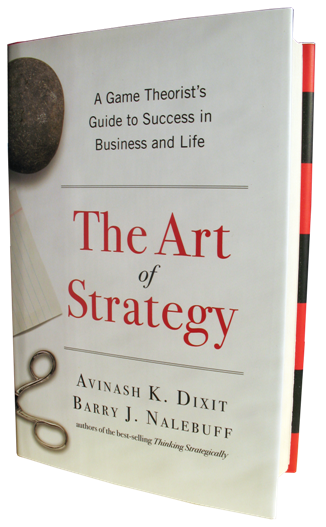– Tips and tricks on how to apply the principles to your advantage
“I think game theory creates ideas that are important in solving and approaching conflict in general. ”
~ Robert Aumann
The principles of game theory and the games that emerge as a result of the principles are very interesting and can help us think of different ways of interacting with the people around us, especially those in professional settings. The fact that the principles centers around playing games helps us to tease out the most fundamental actions and behaviors in a human being, since playing games is what comes natural to us. The fact is that we play games every day whether we know it’s a game or not.
So, how can project and program professionals take advantage of the game theory principles in our work? I propose that every engagement with or stakeholders is an opportunity to utilize these principles.
Now, before we explore the way we might use game theory as a framework, let’s remind ourselves that there are different types of games, and that ideally you want to engage in this work to find win/win opportunities and play cooperative games. Remember “use your powers for good”. Although once in awhile the situation might merit an occasional non-cooperative game.
As a reminder, here are a few of the types of the games and explanations:
Cooperative or non-cooperative[i]
A game is cooperative if the players are able to form binding commitments. For instance the legal system requires them to adhere to their promises. In noncooperative games this is not possible. Of the two types of games, non-cooperative games are able to model situations to the finest details, producing accurate results.
Symmetric and asymmetric[ii]
A symmetric game is a game where the payoffs for playing a particular strategy depend only on the other strategies employed, not on who is playing them. If the identities of the players can be changed without changing the payoff to the strategies, then a game is symmetric.
Zero-sum game[iii]
In zero-sum games the total benefit to all players in the game, for every combination of strategies, always adds to zero (more informally, a player benefits only at the equal expense of others).
Simultaneous and sequential[iv]
Simultaneous games are games where both players move simultaneously, or if they do not move simultaneously, the later players are unaware of the earlier players’ actions (making them effectively simultaneous). Sequential games (or dynamic games) are games where later players have some knowledge about earlier actions.
Perfect information and imperfect information[v]
An important subset of sequential games consists of games of perfect information. A game is one of perfect information if all players know the moves previously made by all other players. Most games studied in game theory are imperfect-information games,
Thinking through the above game types I am sure we can all think of situations in our work that aligns to one or more of these types of games.
With this in mind let’s explore how we might utilize this information as a framework:
As negotiation and communication are primary tasks of project and program managers, let’s root the framework in this, and since game theory is as much about your own strategy as well as knowing the strategy of those around you.
As you prepare for and approach a situation of negotiation consider the following questions:
– What does the person stand to gain or lose? Are they under a time constraint?
– If cooperative, would it be in your best interest to share details prior to the negotiation, and is it to the mutual benefit to determine if you will negotiate simultaneous or sequential.
– What are the mutual and achievable goals for cooperative, and for non-cooperative, what are the goals of the person you are negotiating with?
– Is the person able to make commitments on behalf of only themselves or others?
– Evaluating the other persons strategies, what are some potential risk areas of your strategy or approach? How can they use what they know about you to their advantage?
Just you would act as you play a game of poker with your friends, you must now decide how you approach any stakeholder on your project, decide for each person as you engage them what their strategy is and what they desire to achieve. Can you think of situations where thinking through the above will benefit you? Resource negations with managers, vendor negotiations, project status meetings? I am sure you can think of many other situations where this can be helpful.
For more information on Game Theory and to dig deeper into the application of game theory in business, ‘The Art of Strategy’ by Avinash Dixit and Barry Nalebuf is an excellent start, following is a brief introduction to the book:
“Game theory means rigorous strategic thinking. It’s the art of anticipating your opponent’s next moves, knowing full well that your rival is trying to do the same thing to you. Though parts of game theory involve simple common sense, much is counterintuitive, and it can only be mastered by developing a new way of seeing the world. Using a diverse array of rich case studies—from pop culture, TV, movies, sports, politics, and history—the authors show how nearly every business and personal interaction has a game-theory component to it. Are the winners of reality-TV contests instinctive game theorists? Do big-time investors see things that most people miss? What do great poker players know that you don’t? Mastering game theory will make you more successful in business and life, and this lively book is the key to that mastery.”[vi]



@Loyal – Great questions. A PM should evaluate each and every situation they encounter and apply the Game Theory principle. Most of the time the Win-Win or Collaborative game is preferable, but the situations you give above are examples where that may or may not be a good idea. I would recommend that a PM take a zero-sum approach in areas where as a steward of their organization need to derive the potential short-term benefit of perceived higher return as a result of the ‘game’ with a supplier for instance. The condition to manage however is that if the suppliers strategy is to establish a long-term relationship with the company you represent, then you might be able to get the favorable short-term result you need and still make it a win-win.
In terms of integrity in business I completely agree, one example of an institution working to change this is my alma mater Thunderbird. Check out the oath each MBA graduate takes upon graduation:
Thunderbird Professional Oath of Honor
As a Thunderbird and a global citizen, I promise:
I will strive to act with honesty and integrity,
I will respect the rights and dignity of all people,
I will strive to create sustainable prosperity worldwide,
I will oppose all forms of corruption and exploitation, and
I will take responsibility for my actions.
As I hold true to these principles, it is my hope that I may enjoy an honorable reputation and peace of conscience.
This pledge I make freely and upon my honor.
http://www.thunderbird.edu/about_thunderbird/inside_tbird/oath_of_honor.htm
Would you say, ideally, we should always go for a win-win? Or, does it depend on the nature of the game? For example, with a supplier or customer, win-win seems essential. With a competitor, assuming the game board is by nature ‘zero-sum’, should we strive for win-at-all-costs (win-lose)?
It seems that these days, business integrity has gone by the wayside in favor of the ‘win’. In the 80s, it was more common to have a business operate with integrity…not badmouthing a competitor, making honest business dealings, treating your employees like gold. Today, things are quite different. Is this situation sustainable? Or, will companies that routinely seek the win-at-all-cost ultimately lose the game?